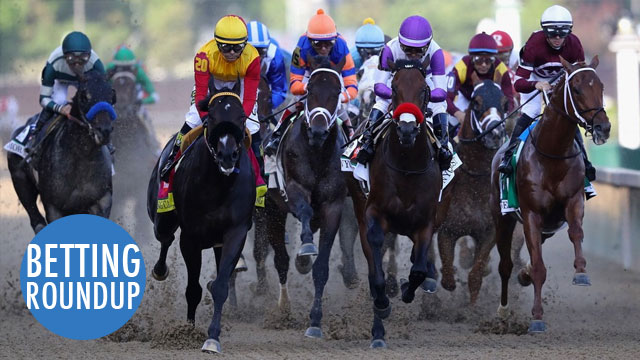Twice weekly, we’ll comb through as many articles, tweets and podcasts as we can find related to the world of sports betting and daily fantasy sports, and publish the good stuff here.
Stumble upon something you think we should include? Email info@bettingtalk.com.
* * *
The annual sports betting handle in Nevada is projected to reach $5 billion this year for the first time. Matt Youmans of the Las Vegas Review-Journal spoke with local sportsbook operators about the growth.
“I’m just flabbergasted,” Vaccaro said. “People can’t get enough of it. It’s growing and growing and growing, and it’s going to get bigger.”
He’s not exaggerating, either. The sports betting handle in Nevada was $2.4 billion in 2006. It topped $3 billion for the first time in 2012, escalated to $4.2 billion last year and is projected to approach $5 billion in 2016.
“The way things are trending, it’s possible,” Michael Lawton, senior research analyst for the Gaming Control Board, said of the $5 billion figure. “On a macro level, the sports betting industry in Nevada never has been stronger. There are a lot of moving parts contributing to what we’re seeing.”
In ESPN.com article says that Nyquist’s team thinks the horse has pretty good odds to win the Triple Crown.
Nyquist won this Derby with relative ease, as well, with jockey Mario Gutierrez guiding him from just off the lead to ahead of the pack with a late and decisive kick. The jockey termed the trip “amazing,” admitting he never even knew — or really cared — about Exaggerator’s late surge.
“He’s not going to allow another horse to beat him. He always has something left,” Gutierrez said of Nyquist. “If someone’s coming late, he can win by five lengths or he can win by a nose. If anyone is coming late, I’ll know he’ll have something else.”
Operators of online horse racing site admitted that “human error” prevented thousands of bettors from being able to place bets on the Kentucky Derby in the hour leading up to the race.
About an hour before the scheduled Derby post time Saturday, Television Gaming Network’s account-wagering website went dark, locking out customers hoping to place bets on the race. The Run for the Roses, won by the undefeated favorite Nyquist, went off at 6:51 p.m., 17 minutes past the scheduled post, by which time the TVG system still had not been restored.
TVG’s site is one of the two leading account-wagering sites in the US, along with Twinspires.com, operated by Churchill Downs Inc.
Wagering on the Kentucky Derby was down 9.7 percent this year from last year, with many in the industry blaming the downturn on the TVG outage specifically. The total amount wagered on the Derby this year was $123.3 million, according to race charts, down from $136.5 million last year.
TVG blamed the outage on “human error,” in an email release sent by the company to customers and signed by CEO Kip Levin.
A column on NJ.com suggests that a case against the manager of an $800,000 survivor pool was just a money grab by local prosecutors.
That didn’t stop the Monmouth County Prosecutor’s Office from raiding his home and accounts just before the start of the NFL season in 2010, jailing him for 25 nights on a money-laundering charge and stringing along his court case before finally reaching a settlement last month.
“This whole thing was a cluster—- from the beginning,” his civil attorney Ralph Ferrara said. “It’s always been about the money, and they’ve never admitted that it’s still about the money.”
The settlement speaks to how little Monmouth County cared about putting Bovery behind bars. He will walk into a probation office in New Brunswick on May 18 and pay a $155 fine, part of his plea agreement to a third-degree felony for “possession of gambling records.”
An American citizen who spent more than 13 years as a fugitive from the United States for his part in an online sports betting company based in Antigua voluntarily turned himself in and avoided a prison term — getting just six months of probation instead.
Haden Ware, who voluntarily returned to the United States in January to plead guilty to a conspiracy charge stemming from his involvement with World Sports Exchange, was sentenced by U.S. District Judge William Pauley in Manhattan.
Prosecutors had sought up to a year in prison. But Pauley rejected what he called the prosecution’s “wooden approach,” saying that Ware had just a small role in the sports betting enterprise, which illegally took bets from Americans.
A LegalSportsReport article says the future of eSports betting is with livestreaming.
In parallel, eSports betting, or forms of wagering on eSports that mimic traditional sports betting, is in its relative infancy.
Currently this form of betting still doesn’t resonate with key segments of competitive video game enthusiasts, e.g. they don’t understand it and/or don’t see an immediate reason to care. Meanwhile,gambling with “skins” is as popular as ever.
In order to effectively reach and build a customer base within competitive gaming demographics, online betting operators looking to expand into eSports must develop a creative content presenceon major livestreaming platforms.
